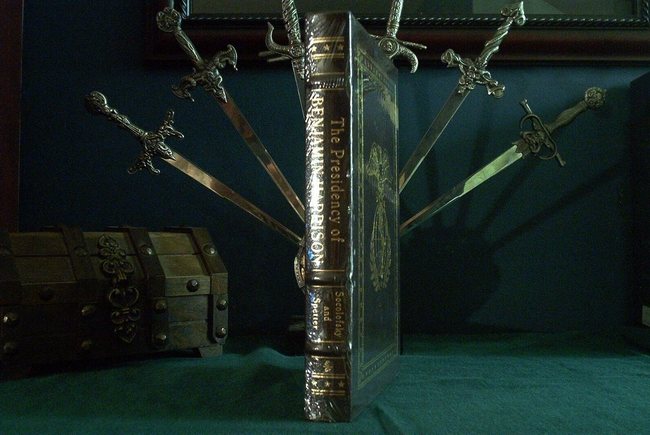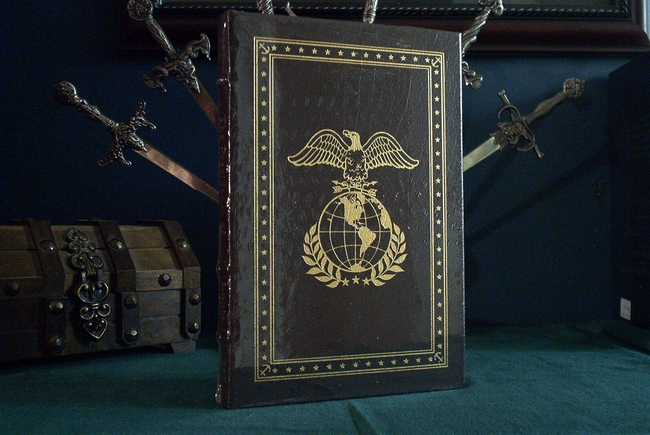Easton Press Benjamin Harrison books
The Presidency of Benjamin Harrison - Homer E. Socolofsky - 1987
Benjamin Harrison - 2 volumes - Harry J. Sievers - 1989
Vol. 1 - Hoosier Warrior
Vol. 2 - Hoosier Statesman, Hoosier President
(This page contains affiliate links for which we may be compensated.)
President Benjamin Harrison biography
Benjamin Harrison (1833-1901), American Statesman and twenty-third President of the United States, grandson of President William Henry Harrison the ninth President of the United States and great grandson of Benjamin Harrison one of the signers of the Declaration of Independence. Benjamin Harrison was born in North Bend, Ohio, and educated at Miami University, Oxford, Ohio. He was admitted to the bar in Cincinnati, in 1853, and was elected reporter of the Supreme Court of Indiana in 1860. He entered the Union Army 1862, and served as colonel of a brigade which saw action at Kennesaw Mountain, Peachtree Creek, and Nashville. He was brevetted brigadier general of the volunteers in 1865, and returned to his Supreme Court post in Indianapolis. Benjamin Harrison was defeated, in 1876, as Republican candidate for governor of Indiana. In 1878 he was appointed a member of the Mississippi River Commission. He was elected United States senator from Indiana in 1880 and declined a post in the cabinet of President James Garfield, preferring to serve in the senate. He served as senator from 1881 to 1887, but was defeated for re-election.The Republican Convention held in Chicago in 1888 nominated Benjamin Harrison for the presidency. He defeated President Grover Cleveland, the Democratic candidate, in the bitterly fought 1888 election, obtaining a majority of the Electoral College vote although losing the popular vote. During President Benjamin Harrison's administration the public debt was reduced and American industry expanded. The outstanding national events during his term in the office of the President were: the first meeting of the Pan-American Congress, passage of the McKinley Tariff act, passage of the Sherman Silver Bill, civil service reform, abolition of the Louisiana Lottery, and expansion of the United States Army and Navy. President Benjamin Harrison was nominated for re-election by the Republican Convention of 1892, but was defeated by his predecessor, President Cleveland. After leaving the Presidential office he returned to the practice of law. In 1899 he appeared as counsel for Venezuela before the international commission appointed to arbitrate the British Guiana - Venezuela Boundary dispute, and was the principal representative of the United States at the Hague Conference, held in 1899.
President Benjamin Harrison wrote the following books:
This Country of Ours - 1897
A collection of essays titled "Views of an Ex-President" - 1901
The Presidency of Benjamin Harrison
The Presidency of Benjamin Harrison by Homer E. Socolofsky presents a comprehensive examination of the life, leadership, and legacy of the 23rd President of the United States. Socolofsky, a distinguished historian, meticulously navigates through the political landscape of Harrison's era, offering readers a nuanced understanding of his presidency. Born on August 20, 1833, in North Bend, Ohio, Benjamin Harrison was born into a family with a rich legacy of public service. His grandfather, William Henry Harrison, had served as the 9th President of the United States. From a young age, Harrison displayed a keen intellect and a strong sense of duty, traits that would shape his future endeavors.Socolofsky paints a vivid portrait of Harrison's rise in the political arena. From his early days as a lawyer in Indianapolis to his tenure as a U.S. Senator from Indiana, Harrison quickly gained a reputation for his intellect, integrity, and dedication to public service. His unwavering commitment to the Republican Party's principles and his advocacy for protective tariffs and civil rights earned him widespread acclaim among his peers. However, it was Harrison's presidency, which began in 1889, that truly defined his legacy. Socolofsky delves into Harrison's presidency with meticulous detail, highlighting his efforts to address the key issues of his time. From his support for the Sherman Antitrust Act to his expansionist foreign policy, Harrison's administration was marked by a flurry of legislative activity and diplomatic initiatives. One of the most significant achievements of Harrison's presidency was the passage of the McKinley Tariff, which raised tariffs to unprecedented levels. While the tariff bolstered domestic industries, it also sparked fierce opposition from agrarian interests and contributed to the economic downturn of the early 1890s.
Socolofsky also explores Harrison's approach to race relations, particularly his support for federal legislation aimed at protecting the rights of African Americans in the South. Despite facing resistance from Southern Democrats, Harrison remained committed to advancing civil rights and equality under the law. In conclusion, "The Presidency of Benjamin Harrison" offers readers a comprehensive and insightful look into the life and leadership of a president who played a significant role in shaping the course of American history. Socolofsky's biography provides a balanced assessment of Harrison's achievements and shortcomings, shedding light on the complexities of his presidency and his enduring impact on the nation.
Hoosier Warrior
In this opening volume of Harry J. Sievers' biography of our twenty-third President, the author has broken down the half-century-old wall of secrecy, procrastination, and neglect surrounding the private papers and personal life of Benjamin Harrison Indiana's adopted son. Here for the first time is the full, documented account of the early years of the grandson of "Old Tippecanoe."From Harrison's boyhood on the family farm in North Bend, Ohio, through the early days of his marriage, political beginnings, and struggle to make a living as an Indiana lawyer, Father Sievers shows us a man whose integrity and modesty endeared him to his intimates, and whose boldness and courage in the Civil War won the devotion of his soldiers and earned for him a brigadier-general's star.
Although he was the grandson of a President and a descendant of a long line of Virginia burgesses, "Little Ben's" own chief assets were simply a devoted wife, a gift for courtroom oratory, and an endless capacity for plain, hard work. Nevertheless, in response to Lincoln's desperate call for volunteers, he left his law desk and and raised the 70th Indiana Volunteer Regiment, which he lead through such battles as Resaca, New Hope Church, and Kenesaw Mountain. It was after his daring charge "up the ridge" at Peach Tree Creek that "Fighting Joe" Hooker promised him his star: "Harrison, by God, I'll make you a brigadier for this fight."
The life of Benjamin Harrison, product of an Ohio-Indiana era now almost forgotten, is the story of a man of courage, independence, and integrity a fascinating commentary on the men, ideas, and politics of the day.
Hoosier Statesman
Hoosier Statesman, Hoosier President is an insightful biography that offers a comprehensive exploration of the life and political career of Benjamin Harrison, the 23rd President of the United States. Authored by [the unknown author] (please provide if available), this biography provides readers with a compelling portrait of Harrison's journey from his humble beginnings in Indiana to the highest office in the land. Benjamin Harrison was born on August 20, 1833, in North Bend, Ohio, but his family moved to Indiana when he was young, and it was there that he spent much of his formative years. Raised in a household steeped in a tradition of public service, Harrison was inspired by the examples set by his grandfather, William Henry Harrison, who served as the ninth President of the United States, and his father, John Scott Harrison, who was a prominent Ohio politician. As Harrison matured, he demonstrated a keen intellect and a strong sense of duty to his community and country. He pursued a career in law and quickly established himself as a respected attorney in Indianapolis. Harrison's involvement in local politics soon propelled him onto the national stage, where his leadership qualities and commitment to the Republican Party's principles garnered widespread recognition.The biography delves into Harrison's political rise, from his tenure as a U.S. Senator from Indiana to his successful campaign for the presidency in 1888. As President, Harrison championed a progressive agenda that included economic protectionism, civil rights advocacy, and a commitment to expanding America's influence abroad. One of the most significant achievements of Harrison's presidency was the passage of the Sherman Antitrust Act, which aimed to curb the power of monopolistic corporations and promote fair competition in the marketplace. Additionally, Harrison's administration oversaw the annexation of Hawaii and played a pivotal role in shaping America's role as a global power.
However, Harrison's presidency was not without its challenges. Economic downturns and political divisions tested his leadership, and he ultimately lost his bid for re-election in 1892 to Grover Cleveland. In conclusion, Hoosier Statesman, Hoosier President offers readers a captivating glimpse into the life and legacy of Benjamin Harrison, a leader whose commitment to public service and dedication to principles continue to inspire generations. Through meticulous research and engaging storytelling, this biography provides a richly detailed portrait of a president who left an indelible mark on American history.
Benjamin Harrison quotes
"I pity the man who wants a coat so cheap that the man or woman who produces the cloth will starve in the process."
"Great lives never go out; they go on."
"The bud of victory is always in the truth."
"I would rather belong to a poor nation that was free than to a rich nation that had ceased to be in love with liberty."
"The disfranchisement of a single legal elector by fraud or intimidation is a crime too grave to be regarded lightly."
"We Americans have no commission from God to police the world."
"The disfranchisement of a single legal elector by fraud or intimidation is a crime too grave to be regarded lightly."
"The Presidency is not an office to be either sought or declined."
"Great lives never go out; they go on."
"We Americans have no commission from God to police the world."

